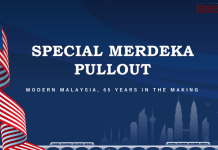A new study by Monster.com, highlighting the importance of prioritising a modern approach to work and encouraging employers to implement policies that promote a wholesome, complete and and harmonious life.

The study which surveyed more than 1,000 respondents across Singapore, Malaysia, and the Philippines, is part of the recruitment portal’s #WorkLifeBalance campaign, which aims to explore working professionals’ sentiments around work-life balance, and raise awareness among employers as to what aspects of work-life balance are most valued by their employees.
Work-life balance is a concept that remains out of reach for a majority of Malaysian professionals, who continue to struggle with unsupportive work environments and a lack of flexi-work policies to encourage a more holistic life.
Over a third of local employees admitted they are dissatisfied with the amount of time they are able to spend with friends and family outside the office.
In fact, 45% of local professionals said their current employers do not have existing policies regarding work-life balance. Although 40% said their managers were “somewhat supportive” of work-life balance in general, they were not consistent in helping employees find a practical balance that works for both the individual and the business. 30% even stated their bosses believe work-life balance as a “fad”.
Malaysian professionals believe organisational support towards better work-life balance is key to enhancing productivity (81%). Obstacles in the form of negative attitudes of superiors (41%) and uncooperative or excessively competitive colleagues (39%) often prevented respondents from achieving their ideal version of work-life balance.
Daily work-related stresses adversely impact the lives of working professionals; 42% worry about work even when not at work, while 38% work long hours on weekends and 29% regularly check work emails after hours. Back pain (16%), fatigue (15%), depression (14%) and frequent headaches (12%) are common work-related illnesses which professionals say plague them at work.
“Malaysia has a long way to go in catering to the needs of its working population. While some measures may already be in place, this is not the general case for a majority of businesses across the country. An attitude and cultural shift is required to embrace the holistic idea of ‘balance’, with education around how to implement policies that don’t negatively affect the business – quite the opposite. There is an abundance of research that proves the adoption of flexibility increases happiness, which has a positive impact on engagement and thus productivity and business growth,” said Abhijeet Mukherjee, CEO, Monster.com – APAC & Gulf.
Most people (85%) identified themselves as “segmentors” at work, meaning they like to have clearly defined boundaries between personal and work lives. Overall, 66% said “work-life balance” means not having to work on weekends, while 65% said it’s the ability to choose flexible working hours. More than half (54%) said it simply means they get to leave work on time every day.









